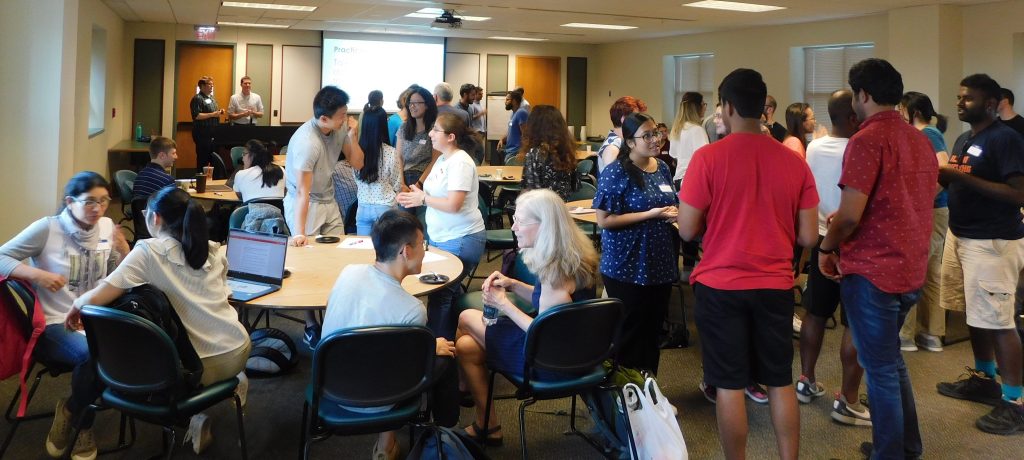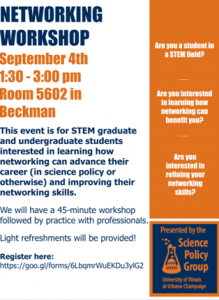
Participants practicing their networking skills!
Event Recap:
On September 4, the Science Policy Group Professional Development Committee, in collaboration with Derek Attig and Mike Firmand of the Graduate College, ran a networking workshop. The workshop primarily focused on learning how to craft elevator pitches targeting legislators and other governmental policy makers, as well as more general networking tips for a broader audience. We really wanted to create a single event where participants could both learn how to network and also have the opportunity to practice with experienced professionals, so we invited four additional faculty/staff members from the University to join us for a reception following the workshop. Those professionals were Dr. Ashlynn Stillwell of Civil and Environmental Engineering, Dr. Gay Miller of Veterinary Medicine, Doris Dahl of the Beckman Institute, and Melissa Edwards of the Office of the Vice Chancellor for Research. Both Dr. Stillwell’s and Dr. Miller’s research inform policy, and they each have previous science policy work experience- Dr. Stillwell at the Congressional Research Service and Dr. Miller through the AAAS Science & Technology Policy Fellowship. Doris Dahl and Melissa Edwards are both experienced science communicators.
Derek and Mike ran the first 45 minutes of the workshop, giving a very interactive presentation on how to network, why it is important, and some common strategies. Tailoring this to the science policy group, Mike kicked off the session by having the group practice elevator pitches, pretending we were pitching our research or job idea to a policymaker. Participants commented that condensing their “pitch” down to 30 seconds was very difficult. Key takeaways here included to NOT to think of it as “dumbing down” the statement, but instead to choose words very carefully, and then practice, practice, practice!
For the next portion of the workshop, Derek gave a more general overview of networking. He emphasized acting as the “host” of the event instead of the “guest,” making sure to introduce yourself to other people and to invite outsiders into your conversation. The goal is to have a few meaningful interactions, NOT to have one extended conversation or to meet as many people as possible. This part of the workshop easily led to the reception, where the professionals spread around the room and participants grabbed some refreshments and began networking with each other.
Over 40 people attended the workshop and event registration indicated that participants were from a variety of departments and at a variety of stages in their academic career (undergrad to post-doc and research staff). At the reception, the room was abuzz with conversation, and it looked like everyone who wanted to chat was able to find a conversation partner or group. We saw even saw some contact information being exchanged! Participants had positive things to say about their experience, and the faculty were enthusiastic about interacting with the Science Policy Group again in the future.

